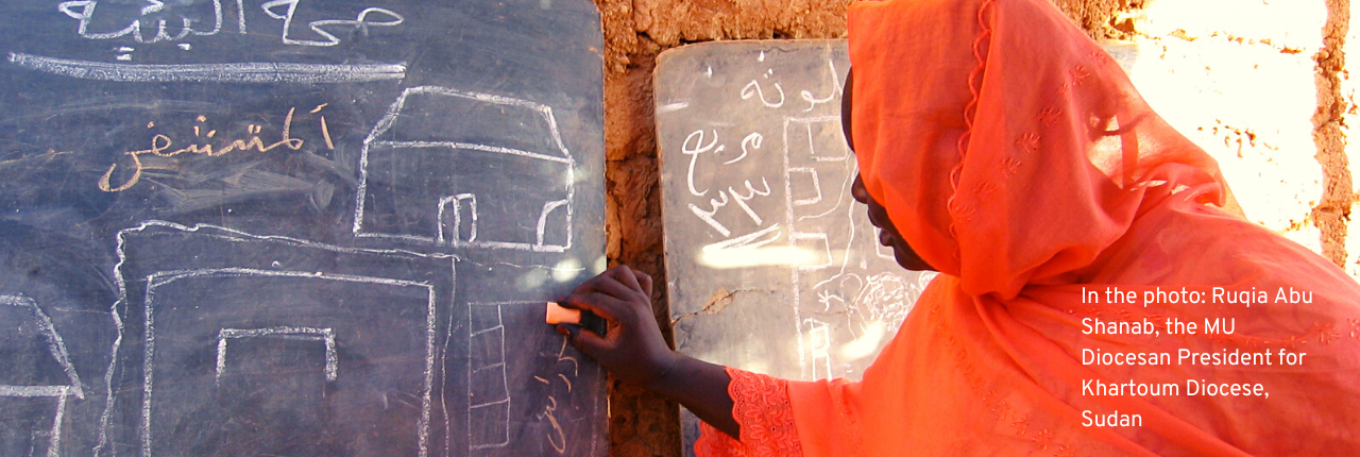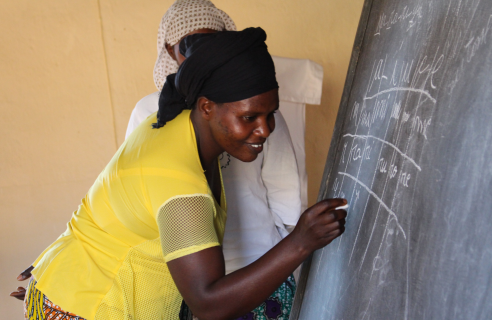You are here

Enabling agents of change: Mothers' Union literacy programme in Sudan
Ruqia Abu Shanab, the MU Diocesan President for Khartoum Diocese, shares how the MU literacy programme helped her transform her life.
As a child, Ruqia wasn’t allowed to attend school because of prevailing cultural and social norms that actively discouraged and looked down upon women getting an education, “Before the MU literacy circle I was blind, I didn't know how to read and write. Joining the literacy circle helped me more than I would ever expect as well as how to read and write sentences (sic). From that time my eyes were opened”.
The programme first started in Khartoum in 2000. It gradually finally into all five dioceses of Sudan in 2019. MU Sudan undertook the training of MU Coordinators to become literacy trainers as planned in April 2019 in Port Sudan in the north of the country. Six women were trained – one each for Port Sudan, Kadugli, Wad Medani, El Obeid and two for Khartoum. Each diocese has now trained 10 volunteer literacy facilitators who facilitate a group of 25 illiterate women in a literacy circle. Alongside the key areas of functional adult literacy skills and participatory learning methodology, the MU Sudan team use participatory bible studies developed by MU Global that are key to helping communities undertake heart and mind transformation and begin to address some of the cultural and traditional harmful practices that contribute to gender disparity and the subordination of women.
Through the programme, Ruqia learned how to understand and cooperate with the community. She said, “Our facilitator did not just focus on literacy lessons only but gave us knowledge on how to be an economically sound woman; a manager and leader at home, and to be a part of decision making and to not leave it up only to men.” Since becoming literate, she opened a centre at the mission place in Omdurman to train women in handicrafts, sewing clothes and tie dyeing clothes. She supports about 20-30 women graduate from this course in a year and has worked as a trainer for the last nine years. The centre includes women from the Christian and Muslim faiths, and the goal of this training is to encourage women to set up small businesses to help themselves, their children and husbands at home.
She has also attended different trainings with other organizations about women’s rights and issues such as FGM (Female Genital Mutilation). She talks to women from different backgrounds about the dangers of circumcising their daughters and the bitter struggle the girls will face in theirs futures if the practice does not stop. FGM continues to affect over 90% of women in some regions of Sudan. MU are trying to tackle this extremely sensitive topic in the literacy circles as it is often shrouded in secrecy and thrives on the culture of silence. The literacy circles can be a very safe place for women to discuss these issues openly with each other.
Ruqia encourages women to form their own groups to encourage others. She started her own business of making and selling handicrafts since becoming an accredited literate learner. She has sold her handicrafts in collaboration with other local women’s businesses at large hotels such as the Corinthia Hotel in Khartoum near the Nile. Her business continues to grow.
She has also been able to study at the Shokai Bible Training and has got a Diploma. With the support from MU members, she progressed in her journey of learning and in November 2019, was elected at the Diocesan President. She is now responsible for 33 Churches in Khartoum Diocese. “Lastly I thank God for his mercies to me. I’m proud that he gives me more confidence, wisdom, patience to encourage women in the Churches and communities.”
To support more women like Ruqia, you can donate to our Literacy and Financial education Programme here.


